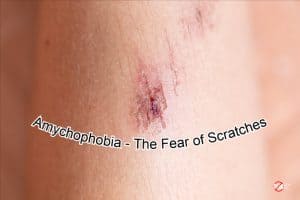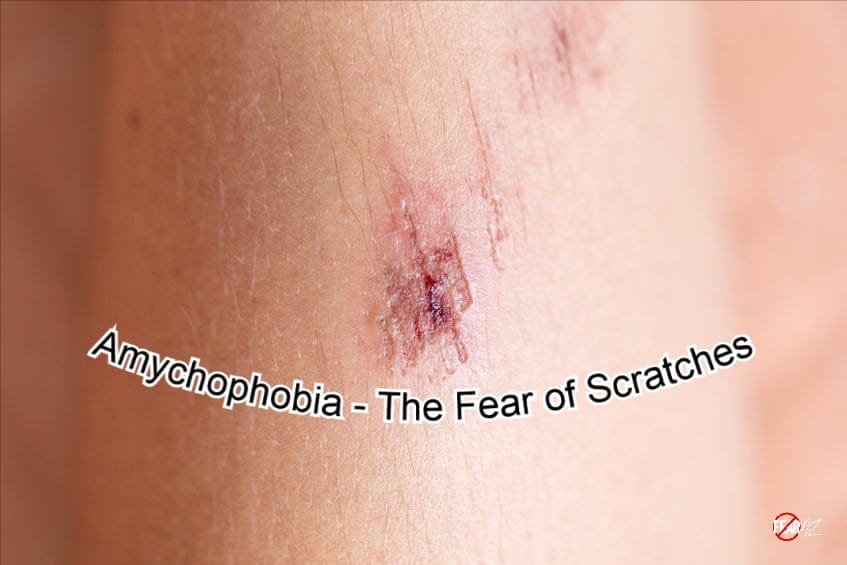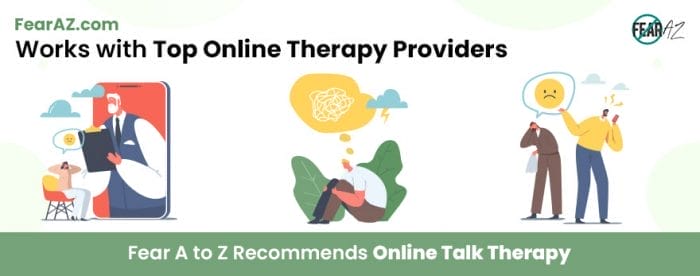Share This Article
The Fear of Scratches or Being Scratched
Have you ever avoided petting a cute dog or cat because you were afraid of being scratched? Do you get so anxious at the thought of being scratched that it distracts your thoughts?
Has the thought of someone or something scratching you kept you up at night?
If you identify with any of those scenarios, you may have a phobia of being scratched. But you can overcome your fear of scratches by first understanding how your fear developed. Once you know the answer, you’ll be able to find ways to cope with this fear and lead a normal, happy life.
What Is the Fear of Scratches?
What does amychophobia mean? It is the fear of scratches, or being scratched, lacerated, or clawed. If you suffer from this fear, you may experience extreme anxiety at the thought of being scratched. Sometimes your stress can be so intense that it can cause you to experience severe symptoms such as panic attacks.

You may not understand what exactly you are feeling when you have these symptoms. Your anxiety may cause you to miss out on special family moments like owning a pet or even going near one.
Amychophobia Causes
Most phobias don’t have a common cause and vary from one person to the next. To know what brought about this fear in you, you’ll have to travel memory lane.
Any sort of emotionally painful moment in the past related to scratching, lacerations, or being clawed may have caused this condition. If you can recall this, that may be the root of your phobia.
Another cause of amychophobia, or any phobia, is genetics. Ask a family member if they know of anyone else in the immediate family who may struggle with phobias.
You may not be able to pinpoint a cause based on past experience or genetics alone. But don’t worry. Scientists believe that both genetics and environment can cause a phobia to develop. Perhaps analyzing these two factors will shed some light on the origins of your phobia.
Some Things You Need to Know about Amychophobia
Sometimes people relate this phobia to unbearable sounds. For example, the sound of fingernails scraping the blackboard. That fear or dislike is not amychophobia. The dislike of that sound is considered a disgust. There is an acoustic resonance that takes place because of the shape of the ear canal. Certain frequencies are amplified. That’s what causes this feeling of disgust in most.
If you suffer from a fear of being scratched, you may find yourself avoiding socializing or owning a pet in an attempt to prevent being scratched by someone or something. But this may worsen your symptoms in the long term. In addition, actively avoiding your fear suggests that you are justifying it.
Symptoms of Amychophobia
Just like any other phobia, you may experience an array of symptoms from generalized anxiety to panic. Those with mild amychophobia may be able to deal with minor scratches or cuts, but those with severe cases of this phobia might experience panic attacks. If you believe you have amychophobia, you may have some of the following physical and psychological symptoms.
Amychophobia may cause the following physical symptoms:
- Hot flushes or chills
- Rapid heartbeat
- Pain or tightness in the chest
- Dizziness
- Numbness in the body
- Ringing in the ears
- A rise in blood pressure
Amychophobia can cause the following psychological symptoms:
- Extreme anxiety
- Fear of losing control
- Fear of dying
- Anger, mood swings
- Difficulty with focus
- Fear of harm
- Withdrawing from others
A person who has amychophobia may experience one or all of the symptoms listed above, depending on the severity of the phobia.
Ways You Can Deal with Amychophobia
Just like any other phobia, amychophobia is irrational and sometimes exaggerated. Some sufferers may be able to cope with amychophobia and lead a normal life. However, if you experience severe anxiety at the thought of scratches, consider seeking professional help.
When to Seek Treatment
Many people don’t need treatment to lead a normal life. They opt to simply avoid the source of their fear. However, you can’t always avoid certain phobias, like amychophobia. Entirely avoiding situations involving scratches is not possible and doing so is detrimental to your mental wellbeing.
So when exactly should you visit a doctor? The points below will help you answer this question:
You should visit your doctor if:
- Your panic attacks have become frequent
- It has become impossible for you to lead a normal life
- You get anxious in public spaces, especially involving animals
- You are struggling to cope with your phobia
- Your symptoms are getting worse every day
How can treatment help you?
- Treatment will help you analyze your thoughts
- It will help you recognize unhealthy patterns
- You will have a place where you can share without being judged
- It will teach you how to deal with uncomfortable situations
- It will help you gain control over your thoughts
Amychophobia Treatment Options
Self-Help: How Can You Help Yourself?
While you may find several professional treatment options, self-help is always a good place to start in dealing with a phobia or any kind of fear. First, try to convince yourself that scratches are not that harmful. If you remind yourself of this repeatedly, your mind will begin to believe.
Relaxation
Relaxation helps control anxiety not just during panic attacks but in other stressful situations you may face. You’ll be able to make better decisions. In addition, deep breathing, yoga, and other relaxation techniques can help ease your physical symptoms.
Meditation
Meditation helps by soothing your nerves and relaxing you. Meditation will help you regain control of your feelings and reduce the frequency of your panic attacks. In addition, you can use meditation to train your mind not to dwell on your fears but to live in the present moment. This is helpful because most phobias are related to past experiences in our lives.
Additional Self-Help Tips
- Learn to take control of your feelings
- Join a support group
- Share what you feel with your partner
- Desensitize yourself
- Challenge your negative thoughts
- Practice breathing techniques
Professional Help
Cognitive Therapy
Cognitive therapy attempts to change how we perceive situations, because we act according to our perceptions. This therapy will prepare you to deal with those times when you’re actually exposed to your phobia. It will help you learn how to control your emotions and make sense of what is real and what is harmful to you.
Exposure Therapy
This type of therapy involves gradually exposing you to your fears over time. The goal is to desensitize you to your triggers and eventually overcome them.
No treatment guarantees a cure from phobia. These forms of treatment are designed to gradually help you better manage your fear so that you can lead a healthy, fear-free life. And remember, always seek a professional opinion before starting any type of treatment.
How to Cope with Amychophobia
The fear of scratches may not be a common phobia, but that doesn’t change who you are. Perhaps you don’t feel confident talking about your fear in front of others, so start with a trusted family member. Gradually work your way up to a friend or therapist who will understand and support you.
Conclusion
By managing your fear of scratches, you can learn to lead a more normal life. Work toward growing more comfortable with pets or situations where there’s a risk of being scratched. Remind yourself that it isn’t harmful. With a little help, maybe one day you’ll own a pet of your own.




